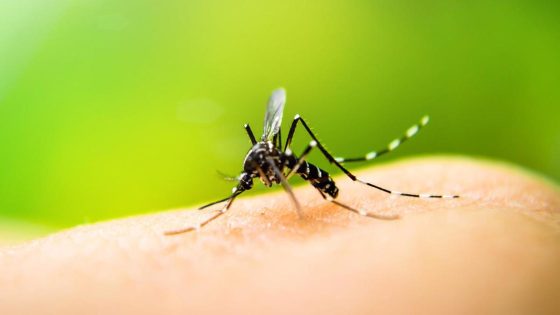A warmer climate means mosquito season is getting longer, prompting not only an increase in the pesky insects but also greater potential for them to spread diseases like West Nile virus.
To help reduce the risk In New York City, expert “insect hunters” track the summer pests among the trees and marshes of parks that residents use to escape the summer heat.
Vector ecologist Zurina Yusoff kills mosquito eggs with a bulky pellet sprayer strapped to her back, while co-worker Hamiltan Simean lays overnight traps for adult mosquitoes. The mosquitoes are then delivered to the public health lab for testing and are sorted by mosquito species.
“When we find a positive sample for West Nile or anything else, we can then increase our mitigation and control methods,” said Dr. Ashwin Bassan, New York City’s health commissioner. “A lot of these viruses are moving further and further north.”
Public health teams of insect hunters start their work during cooler months, counting hibernating mosquitos and dark damp places. That census determines where to focus summer mitigation efforts.
Other mosquito-borne viruses include dengue fever. U.S. health officials recently warned doctors to be alert for dengue as cases this year break international records. Puerto Rico is experiencing an epidemic of dengue, as is much of Latin America, while limited local spread of the virus has also been reported in Florida, Hawaii, Texas, Arizona and California.
West Nile is the leading cause of mosquito-borne disease in the continental United States, accounting for 83% of all domestic mosquito-borne disease cases annually.
West Nile virus symptoms: “It’s an awful disease”
Carol Wallach was infected with West Nile in the summer of 2022.
“I had fever. That night, I passed out in urgent care, taken to the hospital,” Wallach told CBS News. “I think it took close to two weeks before they knew what was wrong with me.”
In addition to a fever, Wallach had a rash, severe nerve pain and trouble walking. Two years later, she still has limited use of her left arm and cannot drive a car.
The majority of West Nile virus infections are asymptomatic, but according to the Centers for Disease Control and Prevention, about 1 in 5 people infected will experience symptoms of the virus that include:
- Headache
- Body aches
- Joint pains
- Vomiting
- Diarrhea
- Rash
“Most people with febrile illness due to West Nile virus recover completely, but fatigue and weakness can last for weeks or months,” the CDC notes. In some people — about 1 in 150 cases —more severe illness can develop with additional symptoms.
Now Wallach wonders about other lingering effects of the virus.
“It’s an awful disease, and I am one of the very fortunate ones, because I’m still here,” she said, adding she’s now also very scrupulous about using insect repellent.
Source Agencies



